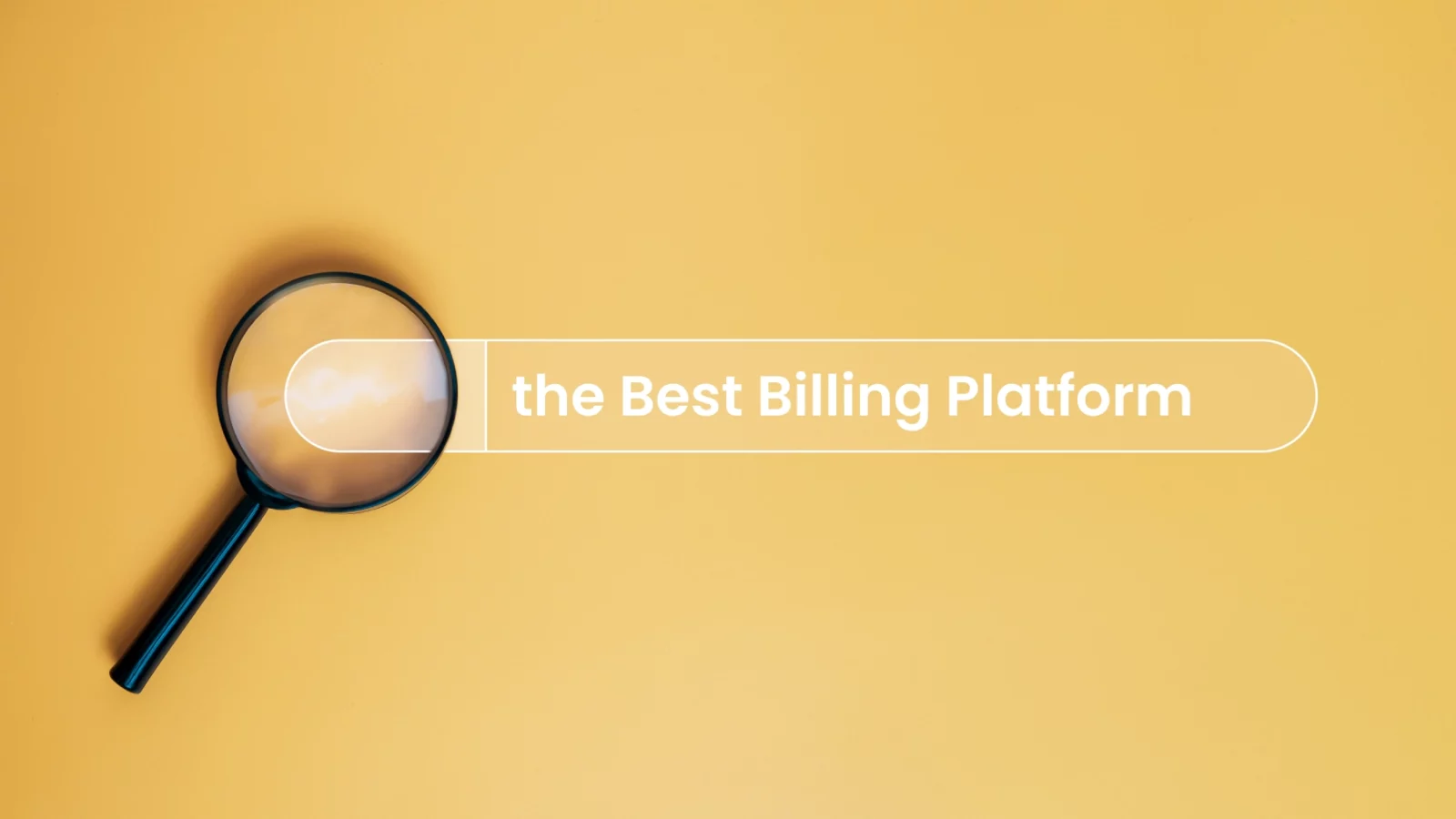Any company that needs to handle subscriptions, automate payments, and manage invoices must select the best billing platform for their needs. Without one, companies may soon encounter problems like incorrect invoices, late payments, and laborious manual procedures.
Therefore, it is even more important to choose a solution that streamlines financial operations because this can lead to cash flow problems and unhappy customers. But it can be challenging to make an informed decision when there are so many options. A well-designed system reduces errors, saves time, and ensures smooth financial operations. But with so many options, how do you pick the best billing platform for your business?
We’ll go over what to look for, important features to think about, and how to make sure the platform you’ve chosen will work for you in this guide. BillPro offers a complete billing solution that is flexible, automated, and seamlessly integrated to support expanding businesses.
What Is a Billing Platform and Why Do You Need One?
For companies of all sizes, the best billing platform guarantees effective financial management by automating procedures and lowering errors.
Software that assists companies in creating, sending, and tracking invoices is known as a billing platform. Additionally, it can manage subscriptions, create reports, and automate payment collection. Furthermore, cutting-edge features like online invoicing, automated invoicing, and subscription billing are available in contemporary solutions, which decrease manual labour and boost financial effectiveness.
Using subscription billing software or a subscription management tool is crucial for expediting payments and customer management if your company depends on recurring revenue. By managing unsuccessful transactions, providing flexible billing options, and automating payment reminders, these tools help lower churn. Therefore, these platforms streamline transactions and improve the user experience by automating recurring payments and customer interactions. BillPro offers an easy-to-use interface that lowers errors and streamlines payment management.
Why Is Choosing the Best Billing Platform Important?
Choosing the best billing platform can have a big impact on your financial health because your billing system is the foundation of your cash flow. Businesses can improve cash flow predictability and reduce late payments by up to 30% by implementing automated billing solutions, according to industry research. Businesses can concentrate on expansion instead of pursuing past-due payments by automating invoicing and payment tracking. However, choosing the incorrect solution can result in inefficiencies, late payments, and irate clients, making financial management extremely difficult.
The best billing platform will:
- Save time with automation.
- Reduce human errors.
- Improve cash flow management.
- Provide clear financial reports.
- Ensure compliance with tax, legal regulations and card scheme rules.
- Offer seamless accessibility from any device.
- Scale as your business grows.
What Features Should the Best Billing Platform Have?
First, you can choose the best billing platform for your company by quickly comparing the main features. The ideal platform should match your industry and stage of growth, whether you’re a small business seeking a straightforward invoicing solution or a large enterprise requiring strong automation.
The best billing platform actually does more than just create invoices; it also streamlines cash flow, automates financial tasks, and promotes business expansion.
See our guide on Billing Models Explained for a more thorough examination of the various pricing and charging strategies.
The following are the main characteristics to look for when assessing billing software:
1. User-Friendly Interface
A billing platform should be easy to use, with a simple and intuitive interface. In turn, a well-designed system reduces errors and makes financial management seamless.
2. Automated Billing & Online Invoicing
Businesses can decrease administrative effort and expedite payment collection by using online and automated invoicing. Businesses can create and send invoices instantly with automated invoicing, which guarantees on-time payments and less work.
Online invoicing, on the other hand, increases payment efficiency by enabling clients to receive and pay invoices electronically. Make sure your system allows automated recurring billing for even more efficiency. This will save time and avoid human error.
What to check:
- Does the platform offer recurring billing?
- Can it auto-generate invoices for subscriptions or instalment payments?
- Does it send payment reminders automatically?
3. Online Invoicing
Online invoicing should be supported by a quality billing platform. BillPro, for instance, enables companies to generate, distribute, and monitor invoices online while enabling clients to pay using a variety of electronic channels.
Online invoicing should be a feature of the best billing platform so that companies can send invoices electronically and accept payments with ease. This implies that customers can pay using digital payment methods like PayPal, bank transfers, or credit cards and receive invoices via email.
What to check:
- Does it integrate with popular payment gateways?
- Can customers view and pay invoices online?
- Does it help you comply with card scheme requirements?
4. Subscription Billing
You need subscription billing software that can handle recurring payments, manage subscription lifecycles, and automate payments if your company uses a subscription model.
Subscription billing software is crucial for managing customer lifecycles, automating payments, and handling plan modifications for companies with a recurring revenue model.
What to check:
- Can it handle flexible billing cycles?
- Does it offer automated payment retries?
- Can it generate reports and projections on subscription revenue?
5. Invoice Management
Keeping track of invoices requires the use of effective invoice management software. Businesses can more easily reconcile payments, organise invoices, and remind clients in a centralised system by using invoice management tools.
In order to track, organise, and reconcile invoices and guarantee that payments are processed promptly, an effective invoice management system is essential.
What to check:
- Can you search and filter invoices?
- Does it generate reports for unpaid invoices?
- Can it send overdue reminders?
6. Customisation & Branding
You should be able to add your company’s branding elements to invoices and other documents using your invoice management software. For example, companies can add logos, change invoice templates, and create a branded payment experience with BillPro’s customisation options.
What to check:
- Can you add your logo and customise invoice templates?
- Does it allow you to brand payment reminders and notifications?
7. Financial Reporting & Analytics
Real-time financial analytics ought to be available in a subscription management tool. In this manner, companies can keep an eye on revenue patterns and make informed decisions. To maintain the accuracy of your accounts, you should also look for a platform that makes payment reconciliation easier.
What to check:
- Can it generate reports on sales, revenue, and outstanding invoices?
- Does it offer real-time analytics?
- Does it support payment reconciliation?
8. Seamless Integrations
Important business tools should be easily integrated with your subscription billing software. For efficient financial operations, this specifically includes accounting software, CRM, and ERP systems. BillPro facilitates smooth integrations and supports APIs to build an effective workflow.
What to check:
- Does it sync with your accounting software?
- Can it integrate with your CRM to streamline customer management?
- Is there API support for custom integrations?
9. Scalability & Growth
It goes without saying that your billing requirements will change as your company grows. As a result, choose invoice management software that grows with your business and can accommodate more transactions. BillPro helps companies expand by offering pricing plans that can handle growing transactions and sophisticated billing requirements.
What to check:
- Can it handle increasing transaction volumes?
- Does it offer features for growing businesses?
10. Secure and Reliable Payment Processing
Secure payment processing is a must for the best billing platform in order to safeguard client transactions and preserve company profits. With the rise in cybersecurity threats in today’s digital world, companies require a system that guarantees data security, fraud prevention, and adherence to industry standards.
To protect financial transactions, look for a platform that offers encryption, real-time fraud detection, and PCI DSS compliance. Furthermore, providing a variety of payment methods—such as digital wallets, bank transfers, and credit cards—improves cash flow and customer convenience.
What to check:
- Does it support various payment methods such as credit cards, bank transfers, and digital wallets?
- Is it PCI-compliant, and does it offer fraud detection measures?
The best billing platform should simplify payment acceptance while ensuring secure payment processing. Look for platforms that support billing orchestration for better flexibility and control.
Feature Comparison Table
To find the ideal billing platform for your company’s requirements, take into account the feature breakdown below.
Businesses must compare important features that affect automation, security, and overall efficiency in order to determine which billing platform is best. A brief comparison of the main features is provided below to assist businesses in selecting the best option.
Feature | Why It’s Important | What to Look For |
User-Friendly Interface | Reduces errors and improves efficiency | Simple, intuitive design |
Automated Invoicing | Saves time and ensures timely payments | Recurring billing, payment reminders |
Online Invoicing | Enables fast, digital transactions | Secure, integrates with payment gateways |
Subscription Billing | Simplifies recurring payments | Supports flexible billing cycles |
Invoice Management | Helps track and organise payments | Search, filter, overdue reminders |
Customisation & Branding | Strengthens brand identity | Custom invoice templates, logos |
Financial Reporting | Provides real-time insights for decision-making | Revenue tracking, analytics |
Seamless Integrations | Connects with business tools for better workflow | API support, CRM and accounting software integration |
Scalability | Supports business growth | Flexible pricing, handles high transaction volumes |
Secure Payment Processing | Ensures safe transactions | PCI compliance, multiple payment methods |
How to Choose the Best Billing Platform for Your Business
Common Mistakes to Avoid When Choosing a Billing Platform
- Ignoring scalability – Your business will grow; choose a solution that can grow with you.
- Not checking integration options – Ensure your billing software connects with accounting, CRM, and payment gateways.
- Overlooking security compliance – Always look for PCI compliance, fraud protection, and encryption features.
Conclusion
In conclusion, the top billing platform streamlines financial operations, improves customer satisfaction, and maximises cash flow. To streamline financial procedures and spur expansion, a reputable solution such as BillPro provides online invoicing, subscription billing, automated invoicing, and invoice management software.
To ensure you make the right choice, ask key questions such as:
– Does it integrate with existing tools?
– Can it scale with business growth?
– Does it offer automation features that save time?
– How secure is its payment processing?
By providing answers to these questions, you can select a platform that best suits your company’s requirements.
Today, take charge of your billing procedure. Find out how BillPro can streamline payments, handle subscriptions, and automate invoicing.

